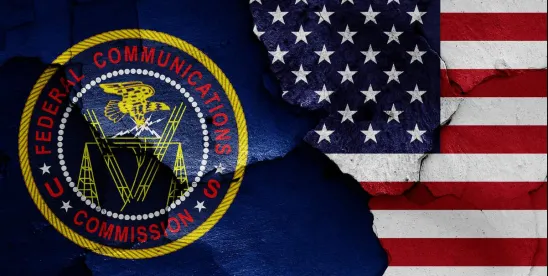Federal Communications Commission Commissioners Geoffrey Starks and Nathan Simington have each announced that they are departing from the FCC on Friday, June 6. Effective with their departures, the FCC will be down to only two commissioners.
Bottom Line: Departures of FCC Commissioners Starks and Simington will leave the Commission with only two commissioners. Until an additional commissioner is confirmed by the Senate, the Commission cannot take Commission-level actions. As a result, Chairman Carr will temporarily be stymied in advancing his policy agenda and the Commission will be unable to rule on major merger transactions. While much of the FCC’s routine work will remain “business as usual,” these handicaps are likely to push the Senate to confirm a third commissioner sooner than originally anticipated.
Background
Commissioner Starks, a Democrat who was nominated by President Trump in his first term, has been a commissioner since 2019. Commissioner Simington, a Republican who was also nominated by President Trump during his first term, has been in office since December 2020.
On February 11, President Trump officially nominated Olivia Trusty, a former Senate Armed Services Committee Republican staffer, for the commissioner seat vacated by former FCC Chairwoman Jessica Rosenworcel. On April 9, the Senate Committee on Commerce, Science, and Transportation (Commerce Committee) held a hearing on Trusty’s nomination. On April 30, Trusty’s nomination was advanced through the Commerce Committee. A full Senate confirmation vote has not yet been scheduled partly due to a desire to wait to give her a full term rather than merely filling out the remaining portion of former Chairwoman Jessica Rosenworcel’s term. Thus, prior to these departure announcements, a full Senate vote on Trusty’s confirmation was deemed unlikely to happen before the July Fourth recess (the Senate returns from the July Fourth recess on July 7).
FCC Operations
The departures of Commissioners Starks and Simington will leave the FCC with only two commissioners, Republican FCC Chairman Brendan Carr, and Democratic FCC Commissioner Anna Gomez, until Olivia Trusty, is confirmed by the Senate.
Without at least three commissioners, the FCC would lack a quorum, which would deprive it of the ability to take Commission-level actions. This could mean removing all items from the agenda for the FCC’s June 26 Open Meeting as the Commission would not be able to hold formal votes on various items, including proposed rules and regulations and enforcement-related matters. Additionally, the Commission would not be able to act on requests for reconsideration of certain FCC actions taken under delegated authority.
While the FCC would temporarily not have its full regulatory functions, Commission staff would still be able to act under delegated authority. Pursuant to the Communications Act of 1934, as amended, the Commission has delegated authority to its staff to act on certain matters. Officials to whom authority is delegated are authorized to perform certain functions, such as issuing orders pursuant to such delegated authority. For example, the Chief of the FCC’s Wireless Telecommunications Bureau has been delegated authority to perform all functions of the Bureau, subject to certain limitations set forth in the FCC’s rules. As such, the Chief of the Bureau will still have the authority to issue and adopt routine licensing decisions.
Given that Commissioner Simington has announced that he is resigning June 6, Republicans will not have the 2-1 commissioner majority that they expected to when Commissioner Starks announced his forthcoming resignation on March 18. As such, there will likely be more pressure on Senate Republicans to hold a full Senate vote on Olivia Trusty’s confirmation prior to the FCC’s scheduled June 26 Open Meeting. Some Democrats, however, have committed to blocking her confirmation unless it is paired with a nomination of another Democratic commissioner.
This is likely to delay action on the proposed T-Mobile acquisition of UScellular as well as the contingent sale of other UScellular spectrum to AT&T and Verizon. The petition for reconsideration seeking to reverse EchoStar’s build out extension and the satellite spectrum proceeding is also on hold. Action on all rulemakings is paused and should the Supreme Court issue an adverse universal service decision, the FCC could be paralyzed and unable to take any necessary action. As far as the elimination of a host of FCC rules teed up from the Delete! Delete! Delete! Proceeding, it will be Delay! Delay! Delay!
As Chairman Carr noted in his blog today – Stay tuned!






 />i
/>i
